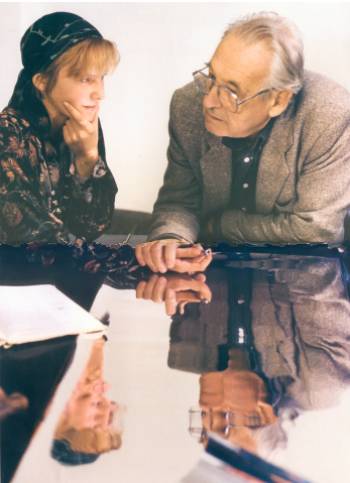 | ||||||||||
Panna Nikt [Miss Nobody]
 fot: Renata Pajchel |
Reviews
Everyone who has read Tryzna's novel is able to confirm that it contains enough ideas for several very different films, varying in style and subject. Wajda selected a plot which allowed him to present Panna Nikt as a modern morality play. Accordingly, it is a story about a young girl who thought that world is a simple place, and it turned out to be chaos; about a girl who set out to conquer this world, and succumbing twice "to the temptations of her friends, twice denied her own self, turning into a nobody". So although Tryzna's novel is "a mysterious book about growing up", Wajda's film could be described as "a mature story about the mystery of immaturity". And here the term "mature" is not used as a qualifier, but merely describes the director's perspective, a fact not lacking in consequences, at any rate formal ones...
Lech Kurpiewski,
"Film", XI/96
In relinquishing the phantasmagoria of the second half of the original book (only some dreams and visions of the heroine are left), as well as the element of sex, and imbuing Marysia's home world with sympathy and understanding, Andrzej Wajda, who made a screen adpatation of Tryzna's Panna Nikt, created a film which is uniquely his own. Whether he managed to avoid all pitfalls is another matter - for example, was he able to preserve the right distance between the girl heroines and himself? This trap was particularly dangerous, as too great a distance meant futile "better wisdom", while its lack threatened that the natural traits of the girls, such as pretentious infantilism, will seep through to the film itself. In several scenes these dangers evidently haven't been avoided.
Bozena Janicka,
"Kino" XI/96
After the premier somebody suggested that perhaps Andrzej Wajda's didn't at all intend to make a film about a Miss Nobody, but that his aim was a metaphorical parable about quite another miss, which in its time was called Miss "S". This interpretation seems a very attractive proposal. Here's a sample: Miss Nobody moves to town from the country - the Solidarity leaders were mostly workers of country origin. Marysia is very religious - the analogy is obvious. Kasia stands for the creative intelligentsia, supporting the workers' movement. Ewa can represent, for example, the whole new-old business class, which has managed to settle so well in the new Polish Republic. Kasia and Ewa embrace each other, cruelly mocking the credulous Miss Nobody, whom they had used so wickedly - and this metaphor is all too evident.
Zdzislaw Pietrasik,
"Polityka" nr 43, X/96
Tomek Tryzna's novel Panna Nikt is available at the Merlin bookstore
Oscar | Films | Theatre | Why Japan?
Favourites | Pictures gallery | About Wajda | Bibliography
Main Page | Search | Wersja polska
Copyright © 2000 Proszynski i S-ka SA. All rights reserved